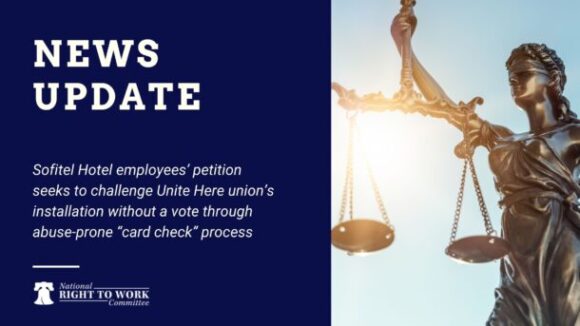Foundation Fires Back Against Biden NLRB ‘Card Check’ Mandate
Brief challenges Labor Board’s attempt to expand coercive, anti-employee organizing scheme
With polls suggesting that Sen. Barack Obama will become the next President of the United States, more and more commentators are beginning to examine the impact Obama’s election will have on the legislative agenda of the Big Labor bosses. The Wall Street Journal‘s take:
Big Labor is hoping to have a big election next Tuesday, with a goal of building a majority to rewrite negotiating rules between unions and management. Though it has received little media attention, Barack Obama’s pro-union agenda is the most ambitious in decades and has a real prospect of becoming law. His stated goal is to “strengthen the ability of workers to organize unions” by doing the following:
– Mr. Obama is a co-sponsor of the Employee Free Choice Act, which would eliminate the secret ballot in union organizing elections. Unions would be certified to negotiate pay, benefits and work rules simply by collecting signed “union authorization cards” from a majority of employees at a work site. The law passed the House in 2007 but didn’t come up for a Senate vote.
Under current law, union organizers and management both have the opportunity to present the pros and cons of forming a union. A secret employee vote is then held. Under Mr. Obama’s proposal, unions would be the sole provider of information to the employee, and the worker’s decision whether to organize would no longer be private.
Unions say current law favors management, which can stall to a point where workers lose interest in organizing. But the median number of days between filing a petition with the National Labor Relations Board (NLRB) and holding an election has actually fallen over the past two decades. In 2007, more than 1,500 such elections were held, and unions won 54% of them, the same win rate of the early 1970s.
– Another labor-friendly provision of the Employee Free Choice Act is mandatory arbitration. Under current law, labor and management are required to bargain in good faith but aren’t obliged to reach an agreement. Under Mr. Obama’s proposal, if the parties can’t settle on a contract within 120 days, the dispute goes to an arbitration panel which can impose a contract that is binding for two years.
As a practical matter, contracts typically involve dozens of provisions dealing with wages as well as seniority, grievances, overtime, transfers and promotions. Rarely is this accomplished in four months. The provision would notably shift bargaining power to unions, which would have an incentive to run out the 120-day clock and let an arbitrator impose a contract that is bound to include much of what unions demand.– Mr. Obama also supports legislation to reverse the NLRB’s “Kentucky River” ruling last year, which fleshed out the definition of a supervisor for the purposes of organizing. Unions usually prefer a narrow definition of management, because it increases the number of people potentially under their control. Conversely, labor has worked to expand the definition of “employee” to include everyone from temp workers to graduate-student teaching assistants.
– The Democrat also wants to bar companies from replacing striking workers — a right that management has held for some 70 years. Unions made a similar push in the early 1990s, and a bill passed the House but was blocked in the Senate. Mr. Clinton issued an executive order that would have ended the provision for federal contractors. It was struck down in federal court. Mr. Clinton then tried to get the NLRB to make it more difficult to replace striking workers. The courts overturned that too. Mr. Obama says he will “work to ban the provision,” but hasn’t provided specifics.
– Mr. Obama supports the Public Safety Employer-Employee Cooperation Act and has said he’d push for its enactment as president. The bill, which passed the House last year and already has 60 votes in the Senate, would force state and local governments to recognize union leaders as the exclusive bargaining agent for police, firefighters and other first responders. More than half of the states would have to change their laws. Thousands of public safety officers would no longer be able to negotiate directly with their employers on their own behalf.
– Last year Congress raised the minimum wage, which is set to rise to $7.25 an hour next year from the current $6.55. But Mr. Obama wants to raise it again, to $9.50 per hour by 2011, and index it for inflation. Mr. Obama says further increases are necessary so that “full-time workers earn a living wage that allows them to raise their families and pay for basic needs.” According to Census data, less than 1% of workers over 25 are earning the minimum. And rather than family heads or full-time workers, they tend to be young single adults, teenagers living at home or spouses providing a second income.
John McCain has not made labor issues a major part of his campaign, but he opposes both the Employee Free Choice Act and the Public Safety Employer-Employee Cooperation Act. The Republican has also gone on the record in support of national right-to-work legislation that would repeal all current federal laws that authorize the firing of employees for refusing to join or pay dues to a union. Some 22 states currently have right-to-work laws, which Mr. Obama opposes.
Brief challenges Labor Board’s attempt to expand coercive, anti-employee organizing scheme

Josh Hawley distances himself from pro-Right to Work pledges, aligning with union bosses like the Teamsters, despite their history of corruption.

Sofitel Hotel employees’ petition seeks to challenge Unite Here union’s installation without a vote through abuse-prone “card check” process